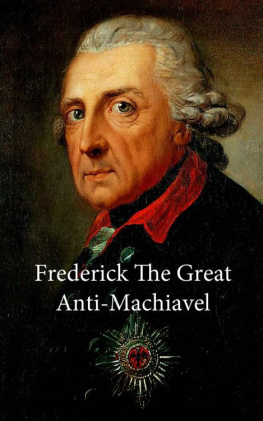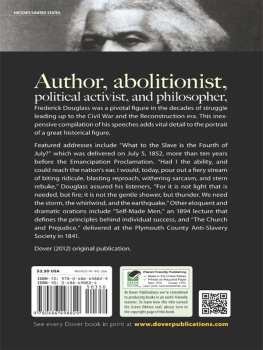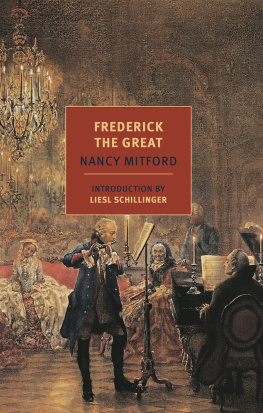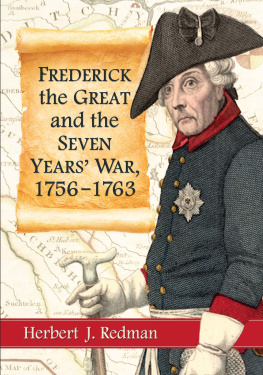
This edition is published by BORODINO BOOKS www.pp-publishing.com
To join our mailing list for new titles or for issues with our books borodinobooks@gmail.com
Or on Facebook
Text originally published in 1942 under the same title.
Borodino Books 2017, all rights reserved. No part of this publication may be reproduced, stored in a retrieval system or transmitted by any means, electrical, mechanical or otherwise without the written permission of the copyright holder.
Publishers Note
Although in most cases we have retained the Authors original spelling and grammar to authentically reproduce the work of the Author and the original intent of such material, some additional notes and clarifications have been added for the modern readers benefit.
We have also made every effort to include all maps and illustrations of the original edition the limitations of formatting do not allow of including larger maps, we will upload as many of these maps as possible.
PRINCE HENRY OF PRUSSIA
Brother of Frederick the Great
by
CHESTER V. EASUM
PROFESSOR OF HISTORY
THE UNIVERSITY OF WISCONSIN
TABLE OF CONTENTS
Contents
TABLE OF CONTENTS
FOREWORD
The man principally responsible for the achievements of Frederick II of Prussia was Frederick himself. No one else earned for him the title of Frederick the Great, Friedrich der Einzige, or Old Fritz. Yet he owed much of his success to the work of his predecessors, particularly the Great Elector and Frederick William I, and much to the help his brother Henry gave him. As the rather obscure figure of the younger brother emerges from the shadow of the throne only as the light of investigation is thrown upon it, so Frederick himself takes on a new and in some ways more attractive appearance as his character is more fully revealed by the study of his relationship with Henry. Far from being discredited, he gains more than he loses as a result of this renewed scrutiny. So does Henry.
An all-inclusive list of those who have contributed to the completion of this enterprise would be far too long for the space available. For the grants-in-aid that made research travel possible the writer is indebted to the Social Science Research Council, the Oberlnder Trust, and the University of Wisconsin; to the University of Wisconsin also for a very generous allowance of research leave, and to his colleagues in the Department of History for their readiness to make so cheerfully the adjustments necessitated by his prolonged absence from the classroom. The librarians and archivists who have helped him are legion; notable among them, and especially entitled to his gratitude, are those of the Harvard College Library; the British Museum; the French National Library, National Archives, and Foreign Office Archives; the German State Library and Heeresbcherei in Berlin; the Archives of the House of Brandenburg-Prussia, the Prussian Secret State Archives, and the German National Castles and Parks Administration; and, first and last, the Library of the University of Wisconsin.
The drawing of Prince Henry on the title page was made by James S. Watrous, instructor in art history in the University of Wisconsin, from photographs of the equestrian statue on the base of Fredericks monument in Unter den Linden, Berlin.
CHESTER V. EASUM
ILLUSTRATIONS
Bronze Bust of Prince Henry
Facsimile of a Letter from Frederick to Henry
Facsimile of a Page of a Letter from Henry to Frederick
Prince Henrys Palace in Berlin
Sans Souci, Fredericks Palace in Potsdam
Portrait of Prince Henry
Portrait of Frederick
Equestrian Statue of Frederick at the Foot of Unter den Linden in Berlin
The Shell Room at Rheinsberg
The Room at Rheinsberg in Which Prince Henry Died
MAPS
Map of Germany in the Time of Frederick the Great
Map of the Partitions of Poland
ABBREVIATIONS USED IN FOOTNOTES
Berner and Volz. Ernst Berner and Gustave B. Volz, Aus der Zeit des siebenjhrigen Krieges.
Bisset. Andrew Bisset, ed., Memoirs and Papers of Sir Andrew Mitchell, K.B.
Fr. F. O. French Foreign Office Archives (Archives du Ministre trangres).
F. B. P. G. Forschungen zur brandenburgischen und preussischen Geschichte.
Hausarchiv. Brandenburg-Preussisches Hausarchiv, the Archives of the House of Brandenburg-Prussia in Berlin-Charlottenburg.
Jany. Curt Jany, Geschichte der Kniglichen Preussischen Armee his zum Jahre 1807.
M. P. Mitchell Papers, British Museum.
P. C. Gustave B. Volz and Others, eds., Politische Correspondenz Friedrichs des Grossen.
Staatsarchiv. Geheimes Preussisches Staatsarchiv, Berlin-Dahlem.
A. Schfer. Arnold Schfer, Geschichte des siebenjhrigen Krieges.
Schning. Kurd Wolfgang von Schning, Militrische Correspondenz des Knigs Friedrich des Grossen mit dem Prinzen Heinrich von Preussen.
Sybel. Heinrich von Sybel, Geschichte der Revolutionszeit.
CHAPTER IA Prince of the Blood
There is an amphibious sort of creature who is neither sovereign nor subject, and who is sometimes very difficult to govern; it is what is called a prince of the blood. Their distinguished origin gives such persons a certain pride, which they call nobility, that renders obedience insufferable to them and any kind of constraint odious. If there is any intrigue, any plot or petty conspiracy to be apprehended, it is lively to emanate from them. In this state [Prussia], they are more powerless than anywhere else; but the best course to take with them is to rebuff sharply the first one who raises the standard of independence, to treat them with all the distinction appropriate to their birth, to load them down with outward honors, but to exclude them from affairs and not to trust them with the command of troops except in favorable circumstancesthat is, when they have ability and one can depend upon their character.
What I say of princes applies also to princesses, who ought never under any pretext whatever to meddle in government.
THE WRITER of these lines was the king of Prussia known as Frederick the Great. The princes of the blood whom he thus described but did not name were his own three brothers, considerably younger than himself, for whom he had become responsible upon his fathers death. The responsibility had weighed heavily upon him, and his authoritarian control had weighed heavily upon them; so he had frequently found them troublesome, and they had always thought themselves harshly treated. With characteristic cynicism, and plainly enough, he stated in his Political Testament of 1752 the point of view of the older brother and head of the family. Princes must not be permitted to forget that the brothers of a king were still his subjects. He seemed never to have asked himself whether his brothers could be happy in the position to which he consigned them, or whether he might have spared them the unhappiness he had himself experienced as heir apparent to the throne. {1}
Uneasy lies the head that hopes to wear a crown. Friction between the representatives of the older and the younger generation in the conduct of the business of John Doe and Son is traditional rather than exceptional. Only very rarely does an American president-elect find it possible to cooperate with his predecessor for a smooth transition from one administration to the next; and even the British have often seen their Prince of Wales discontented and unhappy.













